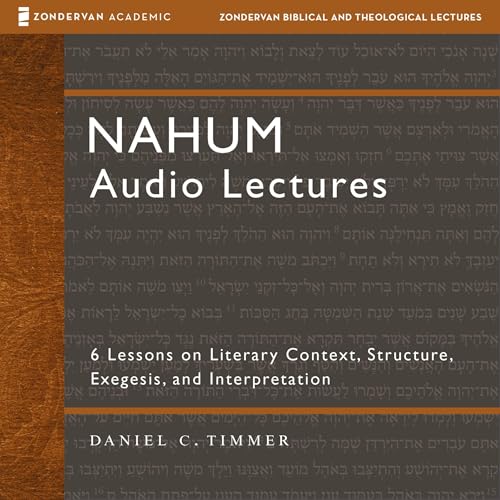
Nahum: 6 Lessons on Literary Context, Structure, Exegesis, and Interpretation
Zondervan Biblical and Theological Lectures
No se pudo agregar al carrito
Add to Cart failed.
Error al Agregar a Lista de Deseos.
Error al eliminar de la lista de deseos.
Error al añadir a tu biblioteca
Error al seguir el podcast
Error al dejar de seguir el podcast
Obtén 3 meses por US$0.99 al mes
 Exclusivo para miembros Prime: ¿Nuevo en Audible? Obtén 2 audiolibros gratis con tu prueba.
Exclusivo para miembros Prime: ¿Nuevo en Audible? Obtén 2 audiolibros gratis con tu prueba.
Compra ahora por $15.71
-
Narrado por:
-
Daniel C. Timmer
-
De:
-
Daniel C. Timmer
The Zondervan Biblical and Theological Lectures series provides a unique audio learning experience. Unlike a traditional audiobook's direct narration of a book's text, Nahum: Audio Lectures includes high-quality live recordings of college-level lectures that cover the important points from each subject as well as relevant material from other sources.
Designed for the pastor and Bible student, Nahum: Audio Lectures, together with the accompanying text on Nahum from the Zondervan Exegetical Commentary on the Old Testament, brings to light the universal scope of God's sovereignty and mercy. With careful analysis and interpretation of the Hebrew text, professor and scholar Daniel Timmer traces the flow of argument in the book of Nahum, showing that how a biblical author says something is just as important as what they say.
Through Nahum, Israel’s divine warrior and deliverer announces a "day" when he will pour out his righteous vengeance on the evil powers that oppose him and deliver those who seek refuge in him. Nahum's message has rich significance for today, challenging its listeners to adopt a radically theocentric view of themselves and their world that puts God and his work as King, Deliverer, and Judge at the center. In this study, each lecture offers the main idea of the passage, its literary context and Hebrew structure, an explanation of the text, and its practical significance for both the original audience and for us today.
Session Titles and Runtimes:
1 - Introduction to Nahum (13 min)
2 - Nahum 1:1 (21 min)
3 - Nahum 1:2-8 (18 min)
4 - Nahum 1:9-15 (18 min)
5 - Nahum 2:1-13 (22 min)
6 - Nahum 3:1-19 (21 min)
©2025 Daniel C. Timmer (P)2025 Zondervan Academic


